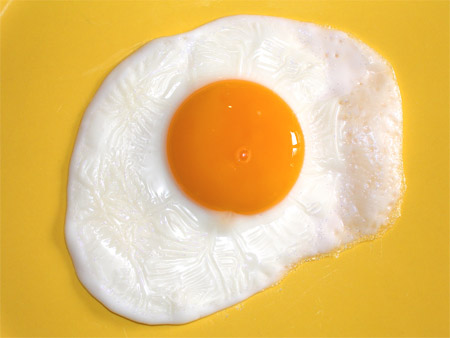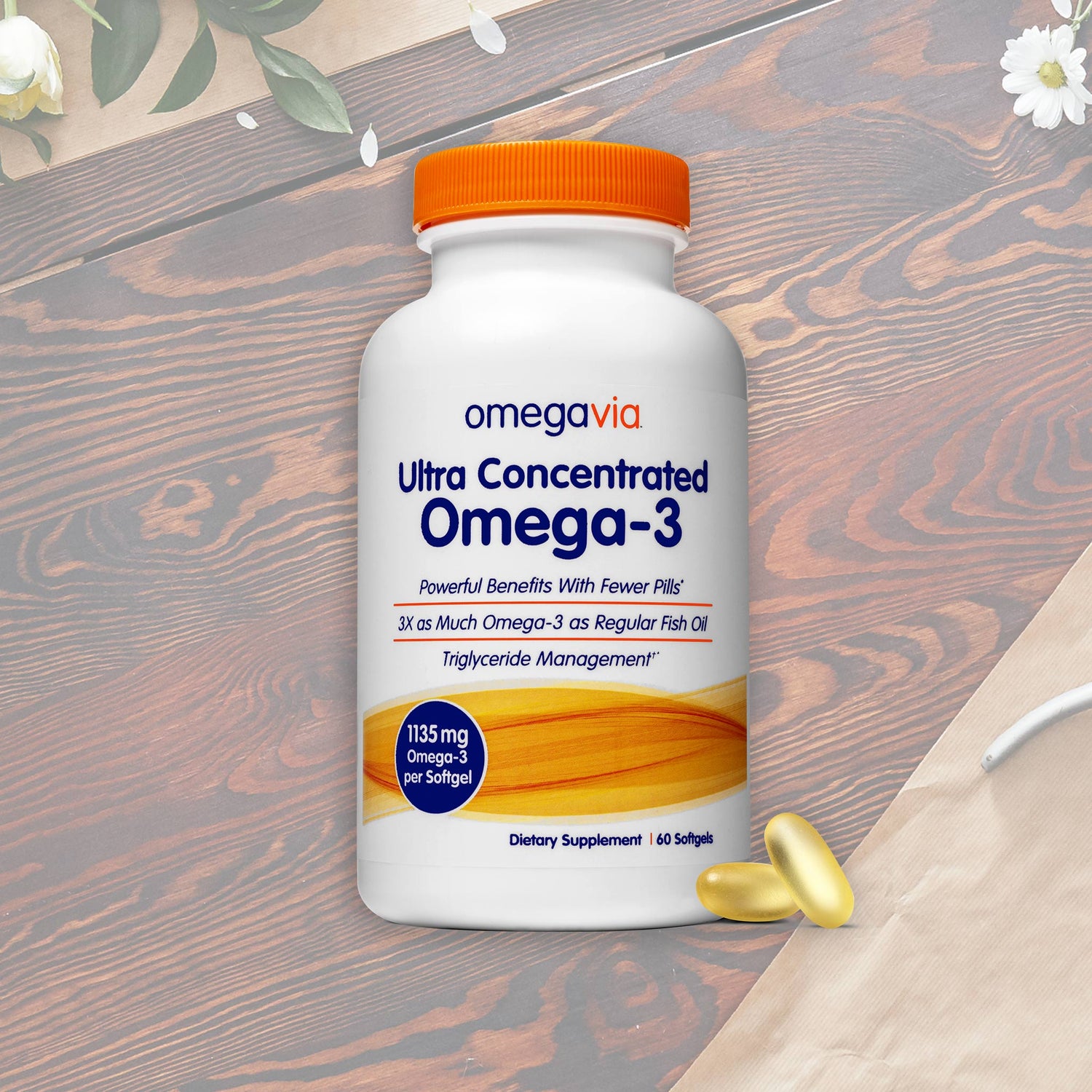This is part 2. See part 1 - Fish Oil & Cholesterol.
Controlling Cholesterol with Diet
Trying to reduce your cholesterol by avoiding eggs and meat alone may not be very effective. Here's why: Most - about 80% - of the cholesterol in your body is produced by your liver and other cells in your body. And for good reason. Every cell in your body has and needs cholesterol. There are hundreds of bodily tasks for cholesterol. 
If you remove all cholesterol from your body, your body will cease to function. Period. It would be foolish of your body to depend on your diet for all its cholesterol needs because some meals may not contain enough cholesterol to sustain the body. And your body knows this. This is why your liver is in charge. Your diet contributes to the remaining 20% or so of the cholesterol coursing through your body. Cutting out meat, or going vegan can modestly reduce your cholesterol. Dramatic drops in cholesterol without a complete rethinking of both diet and lifestyle is likely to be temporarily.* If your body senses less cholesterol in the diet, it will automatically increase liver's cholesterol production. And vice versa, if you're eating a lot of cholesterol, the liver will take it easy on cranking out cholesterol. This is not new science. This knowledge is decades old. If you quit eating meat and become a vegan, to reduce cholesterol, it may work. Temporarily. After all, cholesterol is only found in animal products. Vegetables contain no cholesterol. So, if we ate only vegetables, our cholesterol problem would be licked. Right? RIGHT? But after a couple of months, your cholesterol numbers will start creeping up again even on a vegan diet.
A recent study published by Harvard researchers, followed over 121,000 people over several years. A tiny nugget of data buried in the study showed that:
- people eating the least amount of red meat had the highest cholesterol
- and those who ate the most red meat had the lowest cholesterol
That may be an inconvenient fact and should not be ignored. I am not trying to bash Veganism. I often tell people to make sure that 80% of their plate is vegetables (starchy and not), with only a little bit of meat or seafood.
When to Panic?
What if your total cholesterol is 200? Is it time to panic? Should you panic at 250? 300? You should take it seriously. You need a rational and methodical plan that includes:
- dietary change
- lifestyle change (exercise), and possibly,
- medical intervention with your doctor's help.
Preemptively asking your doctor for cholesterol-lowering statin medications to pound and pummel your cholesterol number into double digits without getting at the underlying causes is not wise in the long term. Although statins may be what some people eventually need.
It's easy to following this logic:
a) if cholesterol is dangerous b) and your cholesterol is going up gradually c) you should simply nip it in the bud before it gunks up your arteries Right? Wrong. A cholesterol number close to ZERO is not good. Or perfect. Having too little cholesterol may be even more dangerous than having too much. Panicky patients driven by fear-inducing TV commercials and enabling doctors preemptively popping statin drugs like candy is not wise. There was a doctor in the UK who called for addition of statin drugs into tap water. Never mind that his name is Dr. John Reckless. For most people, a total cholesterol around 200 is reason for a visit to the doctor for an investigation (rather than panic), especially if you're female and getting older. Your total cholesterol number is not very revealing. There are other markers that are far more predictive of your heart health, like ratio of Total-to-HDL cholesterol or non-HDL cholesterol, or LDL particle number or Lipoprotein (a). Still, I am not suggesting you ignore your Total Cholesterol number. It's a piece of your health puzzle that you need to solve with your doctor. If you must panic, I'd rather you focus on the more predictive markers. Or talk to your doctor about yet other highly predictive markers of health (pieces of the puzzle) such as C-reactive Protein, fibrinogen, oxidized-LDL, fasting glucose, insulin, Lp-PLA2, hemoglobin A1C, or even Vitamin D level. When scientists have tried to model or weight the predictive importance to all of these factors, Total Cholesterol is usually not the top risk factor.
High cholesterol is one of your body's check engine lights
A cholesterol number of 250 or 300 means it is time to open the hood and give the engine a thorough inspection. Blindly reducing your cholesterol number with statin drugs is like unplugging that check engine light. Sure, that annoying red light is no longer there when you start your car in the morning, but the reason why that red light went on still remains. It's up to you and your doctor whether you want to ignore the real problem under the hood. This is why I called hasty, chop-chop statin therapy 'lazy medicine' in a recent blog about Fish Oil & Red Yeast Rice. Before I get drowned in hate mail, let me make the following statements very clear:
- If you're on statin therapy, talk to your doctor. DO NOT self-diagnose and stop taking prescription medications without talking to your doctor - that can be dangerous.
- If you have a genetic condition called familial hypercholesterolemia, you probably ought to be on statins.
- If you have been diagnosed with heart problems, your doctor may justifiably put you on statins.
What if you don't fall into the above categories? Well, then, it is time to look under the hood. If the only solutions your doctor knows for high cholesterol is to:
- Immediately put you on statins
- Tell you to cut meat and fat from your diet
Ding-ding-ding! It's time to look for another doctor. Some doctors - a sad commentary - will prescribe statin drugs even if the patient does not absolutely need it, to reduce the risk of negligent malpractice lawsuit. Sigh. But the good ones who have the time to practice good medicine, without being harassed by insurance companies, know that high cholesterol is often just a symptom of metabolic or endocrine disorder. High cholesterol could be caused by:
- Thyroid imbalance
- Infections
- Inflammation
- Nutritional imbalance
Most allopathic doctors rarely focus on inflammation or nutritional deficiencies - that's a whole another rant/blog. But for many, understanding thyroid imbalances and fixing it through medication or even iodine therapy may fix the problem. DO NOT do this without your doctor's help! Your thyroid is not a do-it-yourself project! Don't even think about it. Speaking of inflammation, what are key causes of inflammation? Too much Omega-6 from vegetable oil consumption. Along with obesity, excess glucose, and gut microbiome imbalance. If your high cholesterol is due to this, then, you'll need to address all of these root causes as well. Not addressing obesity, excess blood glucose, or gut dysbiosis is akin to unplugging your car's check engine light. Statins may reduce your cholesterol number and your overall risk. It might help you sleep easy without worries. But don't, for a second, think that the root cause issues that produced the problem is gone. The monster is still under the bed if you do not address diet and activity.
The solution to most metabolic disorders:
...is not found in a pill. Wish it was! The solution is a simple, a whole foods diet that's mostly non-starchy vegetables, along with some Omega-3 rich seafood, grass-fed meats, fruits, nuts and pastured eggs, all cooked in low-Omega-6 fats like olive oil. A small portion of the population reacts to dietary saturated fats with dramatic increase in cholesterol levels. If you fall into this group, then, rely exclusively on Omega-9 or oleic-rich fats like olive oil. Note the absence of sugars, grains and Omega-6-rich seed-based vegetable oils! Popping a bunch of fish oil supplements will not correct metabolic disorders. Wish it did! High dose Omega-3 supplementation only gets you partly there...what's truly required to address metabolic disorder are exercise, reducing Omega-6 rich seed oils, and near-complete elimination of sugar and refined flour, while increasing fiber consumption from vegetables.*
Mainstream medicine is changing...slowly
Dr. Dwight Lundell, cardiologist, explains all this a bit more thoroughly...
The only accepted therapy was prescribing medications to lower cholesterol and a diet that severely restricted fat intake. It Is Not Working! These recommendations are no longer scientifically or morally defensible. The discovery a few years ago that inflammation in the artery wall is the real cause of poor heart health is slowly leading to a paradigm shift in how poor heart health and other chronic ailments will be treated. What are the biggest culprits of chronic inflammation? Quite simply, they are the overload of simple, highly processed carbohydrates (sugar, flour and all the products made from them) and the excess consumption of omega-6 vegetable oils like soybean, corn and sunflower that are found in many processed foods. - Dr. Dwight Lundell, Cardiologist
BBC Video: Statins - use them or lose them?
So should you ignore your high cholesterol?
No. Don't ignore it. High cholesterol just means it's time for you and your doctor to take a better look under the hood. If the root cause is metabolic disorder, combine vigorous exercise with the dietary suggestions mentioned above. Statin drugs do not fix metabolic disorders. If the root cause is thyroid imbalance, work with your doctor or an endocrinologist to address it. Statins don't fix this. If the root cause is inflammation, work with an Integrative Medicine MD to address it. Statins don't fix this either. If it is an infection, again, work with your doctor to address it. Panicking about cholesterol won't get you far. What you need is a methodical plan developed by your doctor, nutritionist, and your gym trainer. You didn't get here overnight. And the problem won't be solved overnight. Start addressing root causes of the issue. *Individual results may vary. These statements have not been evaluated by the Food and Drug Administration. This product is not intended to diagnose, treat, cure, or prevent any disease. Clinical research suggests the omega-3 dosage needed to help maintain healthy triglycerides is 2000-3000 mg per day when used as part of healthy diet and exercise.



